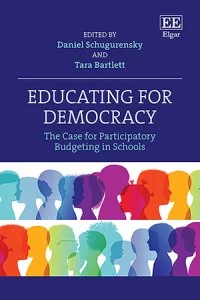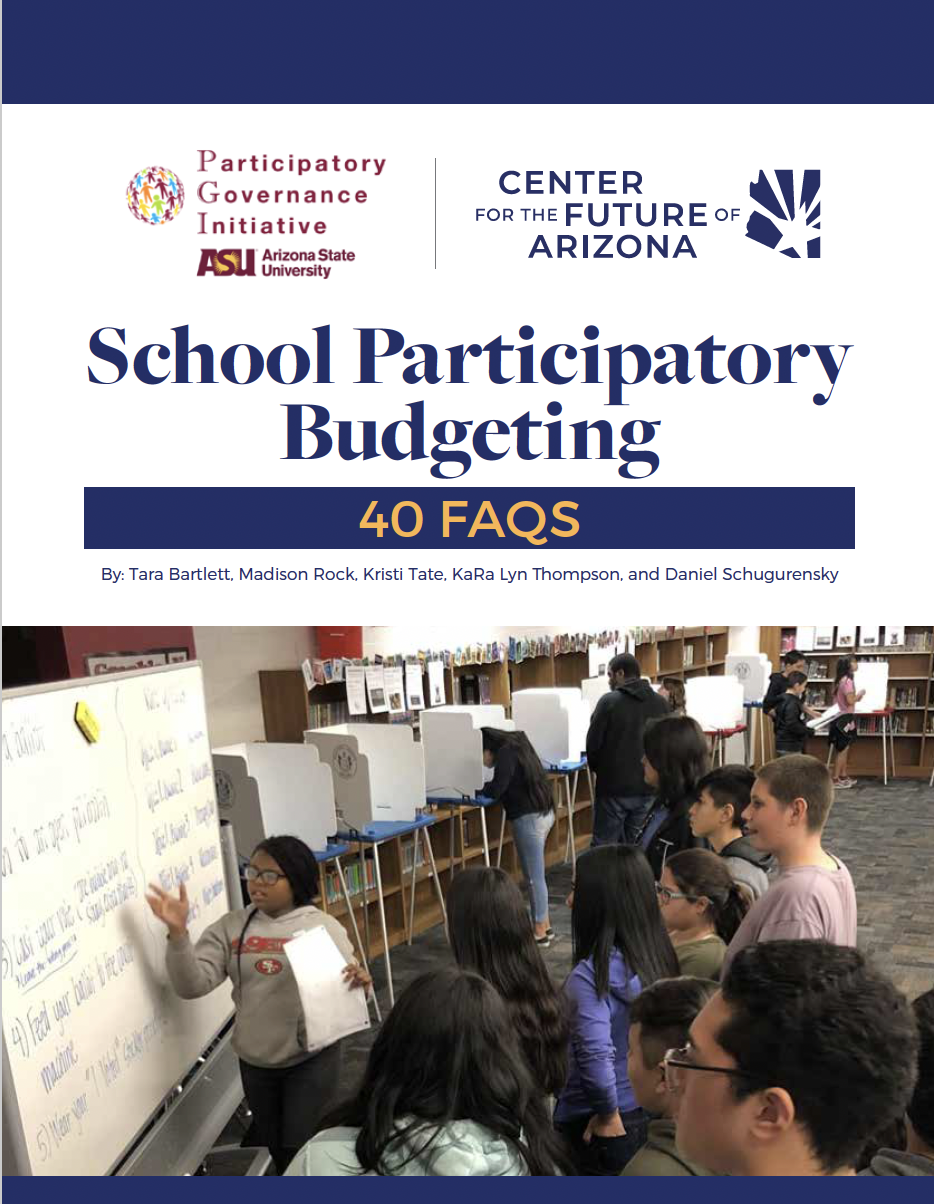Educating for Democracy: The Case for Participatory Budgeting in Schools

"This captivating book provides a detailed examination of school participatory budgeting (SPB), a democratic process that combines citizenship education, civic engagement and participatory governance. Presenting insights from SPB processes across the globe, it advocates for the wider rollout of programs that amplify students’ voices, their deliberative capacities, and decision-making power while improving school climate and campus infrastructure.
Daniel Schugurensky and Tara Bartlett bring together an international range of practitioners and researchers to analyze the main accomplishments, challenges, and lessons learned through the design, implementation and evaluation of SPB. Chapter authors highlight how SPB is gaining traction and how national and local contexts can explain similarities and differences. The authors contend that this learner-centered pedagogy nurtures student agency, cross-curricular learning, prosocial behaviors and democratic practices. This book is an essential tool for teachers, educational leaders, and scholars from social sciences and related fields interested in implementing SPB and evaluating its impact."
Galindo, G. & D. Schugurensky (2024). Latin America’s second pink tide at a crossroads: Between democratic backsliding and democratic innovations. In C. Levy and M. Larrabure, eds., When the light gets induring the darkest days: New democratic initiatives in authoritarian 21st centuryLatin America. NY: Rowman and Littlefield.
Schugurensky, D., & Mook, L. (2024). Participatory budgeting and local development: Impacts, challenges, and prospects. Local Development & Society, 1-13.
Kim, Jiho (2024). Distributive justice in collaborative outputs: Empowering minority viewpoints through deliberation. Journal of Public Administration Research and Theory, 34(1), 1-15.
Bartlett, Tara & Daniel Schugurensky (2024). School participatory budgeting and citizenship education–where are we at? In D. Schugurensky and T. Bartlett (eds.) Educating for Democracy: The case for participatory budgeting in schools. London: Edward Elgar, 1-22.
Sabina Schnell, Jiho Kim, Greg Munno, and Tina Nabatchi (2024). How Citizens Want to ‘See’ the State: Exploring the Relationship between Transparency and Public Values. Public Administration Review 84(2): 357-372.
Bartlett, Tara, Madison Rock, Daniel Schugurensky & Kristi Tate (2023). School Participatory Budgeting: Evaluation Toolkit. Phoenix: Participatory Governance Initiative and Center for the Future of Arizona.
Bartlett, T., & Schugurensky, D. (2023). Inclusive civic education and school democracy through participatory budgeting. Education, Citizenship and Social Justice, 0(0).
Bartlett, T., & Schugurensky, D. (2021). Reinventing Freire in the 21st Century: Citizenship education, Student Voice and School Participatory Budgeting. Current Issues in Comparative Education (CICE), Volume 23, Issue 2.
Gibbs, N. P., Bartlett, T., & Schugurensky, D. (2021). Does school participatory budgeting increase students’ political efficacy? Bandura’s ‘sources’, civic pedagogy, and education for democracy. Curriculum and Teaching, 36(1), 5-27.
No, W., Mook, L., & Schugurensky, D. (2017). Ideation in an online participatory platform: Towards a conceptual framework. Information Polity, 22(2-3), 101-116.
No, W., Mook, L., & Schugurensky, D. (2016). Concurrent or integrated hybridity? Exploring offline and online citizen participation in invited spaces. International Journal of Organization Theory and Behavior (IJOTB), 19(4), 514-534.
Participatory budgeting process on school safety
In 2021, the Participatory Governance Initiative (PGI) and the Southwest Interdisciplinary Research Center (SIRC) partnered to assist in a participatory budgeting process on school safety carried out by the Phoenix Union High School District. To help inform this process, PGI and SIRC produced two reports: one on the main research findings related to school resource officers, and the other on alternative programs to promote school safety.
Read more:
Phoenix Union High School District School Safety Alternative 2021
School participatory budgeting: A toolkit for inclusive practice
By Tara Bartlett, Madison Rock, Daniel Schugurensky and Kristi Tate
School Participatory Budgeting (SPB) empowers students to “learn democracy by doing” by deciding how district funds are used to improve their school communities and prepares young people to be active, informed, and engaged participants in civic life for the long term. The process builds student agency, confidence, communication, critical thinking and problem-solving skills. SPB stems from the widely adopted municipal PB model founded in 1989 in Porto Alegre, Brazil, both of which follow an iterative five step process of creating the rules and guidelines, collecting ideas, developing proposals, voting, and implementing winning projects. Phoenix Union High School District (PXU) in Arizona was the first to pilot the model with district dollars, scaling from one school in 2013-14 to district-wide expansion by 2019-20. In partnership with the Center for the Future of Arizona (CFA), the Participatory Budgeting Project (PBP), and the Participatory Governance Initiative (PGI), SPB is now being implemented in five Arizona cities with a reach upwards of 50,000 students every year and continued growth and adoption anticipated in the coming years. The Arizona SPB process has also sparked implementation in the U.S. and internationally.
The purpose of this toolkit is to share promising practices gleaned from the inclusive SPB model and developed in response to the inclusivity challenges noted above with practitioners and educators seeking to engage students with disabilities in the SPB process. The practices and lessons learned through this project serve as a promising model for other SPB processes in Arizona and around the world that are striving to increase inclusivity.
By the people: Participatory democracy, civic engagement, and citizenship education
Edited by: Won No, Ashley Brennan, and Daniel Schugurensky
This collection brings together writings on three related areas of theory, research, and practice that do not interact as often as they could: participatory democracy, civic engagement, and citizenship education. We believe academics, practitioners, and policy-makers working in these fields can benefit from each other’s contributions.
That was the spirit of the Conference ‘By the People: Participatory Democracy, Civic Engagement, and Citizenship Education,’ hosted by the Participatory Governance Initiative of Arizona State University (ASU) in December 2015 in Tempe, Arizona.
Approximately 200 participants from all over the world gathered at the conference at ASU. Among them were undergraduate and graduate students, scholars, researchers, elected and appointed officials, teachers and school administrators, community organizers and practitioners from a variety of governmental and non-governmental agencies. During three days, conference participants exchanged ideas, research findings, and practical insights. They also shared lessons learned from the successes and failures of different types of projects. The conference had 55 sessions, organized in 12 roundtables, 37 panels, 4 workshops, and 2 plenary sessions.
After the conference ended, we invited presenters to submit a paper based on their presentations. The result is this volume with 34 chapters organized alphabetically in three main parts: the first deals with participatory democracy, the second with civic engagement, and the third with citizenship education.
We believe that it is important to create more spaces to share and discuss theoretical insights, research findings, and reflections from practical interventions in the three fields to develop more synergies and interdisciplinary collaborations. We hope that this volume, which constitutes a sample of the approximately 200 presentations made at the conference, makes a modest contribution towards this effort.
